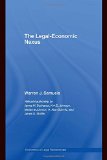

 |

|

The average rating for The Legal-Economic Nexus based on 2 reviews is 4 stars.
Review # 1 was written on 2016-10-24 00:00:00 Mark Waner Mark WanerPolitical Ideals is a long lecture that Bertrand Russell was banned from giving (I believe at a university), but which one of his friends read in his stead, and his friend only afterward credited Russell as the writer of the lecture. His friend did this for him because he thought, apparently, the lecture was important enough to give. Political Ideals is a book that promotes human beings' innate creative capacities instead of their innate possessive tendencies. Seeming inconsistencies in the book could be illustrated by the following example. In an early section, Russell argues for the abolition of capitalism since he believes this encourages possessive tendencies over human creativity. Then in a later section when he is writing of trade between nations, he argues that countries should not impose tariffs in importing and exporting resources and that free trade is the optimal condition in arrangements between nations. The inconsistency, then, would be between promoting on the one hand the abolition of the capitalist system and on the other hand the promotion of free trade, which if capitalism is understood as the investment of time, labor, resources, etc., for profit in terms of a wage or resources deemed to be of equal value, then free trade would be the absence of restriction upon goods and services exchanged in a capitalist system. Russell's views, therefore, promote capitalism and discourage it. However, no inconsistency exists between the two positions if a person distinguishes between what Noam Chomsky calls 'goals' and 'visions.' Visions are long-term schemas that are to be reached at some future point or that are supposed to, at least, provide the position that one would hope to reach, to maximize, say, justice. Goals are short-term, immediate plans to deal with immediate problems. Using this understanding, Russell's goal or short-term plan would be to encourage free trade and his vision or long-term schema would be the abolition of capitalism. Although I agree that it is important to have certain goals and visions if one wishes to have some sort of political position, I disagree with several of the particularities and the realistic prospects of doing what Russell proposes. But I shouldn't editorialize. You should read the book for yourself, and make up your own mind. |
Review # 2 was written on 2014-03-14 00:00:00 Stephen Calabretta Stephen CalabrettaThis was a lecture that Russell wrote during the first world war, and thus, contained vital tokens of his political thought along with romantic language he used to encourage. I chose to read this because I am endlessly interested in Russell's critique of BOTH ideologies of conservatism and socialism. In these pages, one can find Russell's explicit denunciation of capitalism and the wage system (as he calls for it to be abolished) as well as his complete disregard for any form social organization resembling anarchy. He makes sweeping phycological observations about human nature (narrowing our desires down as humans to either Possessive vs. Creative) as well as unsubstantiated sociological observations about human interactions. Russell also does not find time to punctuate which institutions he feels are necessary or which aren't which could contribute effectively to his argument. As a statist and a liberal, Russell does little to add to contemporary thought regarding social democracy or welfare state promotion and instead perpetuates thinking along the lines of John Locke and Wilhelm Von Humboldt. The only difference, and its the reason why I love to read anything Russell wrote, is that he uses such beautiful, hopeful language for his visions of a future society. In short but poignant sections, he always finds conclusive sentences to mark this eloquent departure: "There can be no final goal for human institutions; the best are those that most encourage progress toward others still better. Without effort and change, human life cannot remain good. It is not a finished Utopia that we ought to desire, but a world where imagination and hope are alive and active" (17). |
CAN'T FIND WHAT YOU'RE LOOKING FOR? CLICK HERE!!!